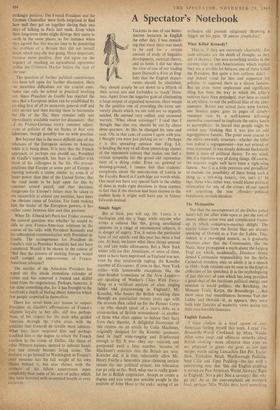Simple Sages
But at least, you will say, Dr. Leavis is a theologian and not a Sage; while anyone who writes a column like this, giving unsolicited opinions on a range of unconnected subjects, is in danger of sagery. Yes, it seems the particular bane of our epoch; and this year has been a bad one. At least, we know what these things amount to, and can make allowances But a New York writer tells me that Americans, or some of them, seem to have been impressed, as England was not, even by that amateurish ragbag, the Koestler number of Encounter. (Come to that, New York critics—with honourable exceptions like the clear-headed iconoclasts of the New Leader— are speaking of Wesker's Chips With Every- thing as a veridical analysis of class, singing habits and potato-eating in England.) Mr. Koestler, who knows the British working class through an association twenty years ago with the stratum then called up for the Pioneer Corps —as who should speak of a year's debs as a cross-section of British womanhood—is another -of those who often appear to deduce their facts from their theories. A delightful illustration of this centres on an article by Colin MacInnes, originally designed for the Koestler potpourri (and in itself wide-ranging and ill-informed enough to fit). It was—they say—rejected, and postponed until a later number, because of
Macinnes's assertion that the British are sexy. Koestler did, it is true, reluctantly allow Mr.
Henry Fairlie a heterodox piece claiming certain virtues for our political system; but toleration can go only so far. Well, what one is really grate- ful for is British empiricism. Accept or create a dogma and you soon put sensible people in the position of John Huss at the stake, saying of an
orthodox old peasant religiously throwing a faggot on his pyre, '0 sancta simplicitasi






























































 Previous page
Previous page